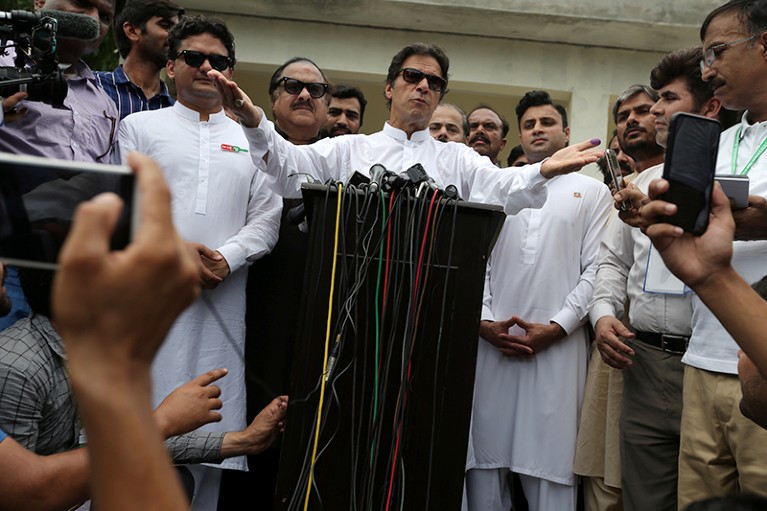
Cricket star-turned-politician Imran Khan after casting his vote during the general election in Pakistan in July.Credit: Athit Perawongmetha/Reuters
It took US President Donald Trump 18 months to announce a science adviser. By contrast, Pakistan’s new prime minister, Imran Khan, is widely expected to appoint a science minister in the early stages of his administration. It will be a welcome move: scientific expertise will be essential in shaping the country’s future. But whoever it is will have a fight on their hands to ensure that inclusive and evidence-based advice prevails.
Khan has come into office promising anything but business as usual. In an echo of America’s New Deal and the first post-Second World War European governments, he has pledged a welfare state, affordable health care, school reform, improvements to agriculture (the backbone of the economy), and an axe to public-sector corruption.
To do all this, his government will need medical researchers and health-care specialists to advise on plans for a national health service; primary- and secondary-school educationalists to work out how best to get every child into a good school; and science and innovation policy experts to guide academic researchers on the path to quality improvements and better community engagement.
Khan has repeatedly said that he will appoint the best people to top jobs. On that score, however, his ministerial team of mostly political appointees has had mixed reviews. What the new ministers lack in particular is a wide-ranging and credible network of experts to call on. There is a shortage of people — and especially women — from high-level academic and other professional backgrounds plugged into policymaking. Khan knows this and has appealed for help. So far, the calls have been heeded by economists in particular, as evidenced by the prime minister’s 18-member Economic Advisory Council — albeit an all-male one.
But one obstacle to gathering expertise is the state’s persistent failure to confront rising intolerance, particularly against minorities. In a backwards move, Khan last week bent to the will of the TLP, a far-right political party that attracted more than 2 million votes in July’s elections, and he removed Princeton University economist Atif Mian from the Economic Advisory Council. Mian’s nomination was challenged by the TLP solely because he belongs to the Ahmadiyya, a much-persecuted minority Muslim community. Mian is highly regarded and his dismissal has been roundly condemned; the other two international members of the council resigned in protest.
The move signals an unwillingness by Khan to appoint advisers who can speak truth to power — and that could have a wider, chilling effect. It will make other independent experts think twice about joining Khan’s cause or advocating vital but unpopular reforms.
The new government has ratcheted up expectations with a list of tasks on which lives depend. One of Pakistan’s most urgent challenges, for example, is to improve the availability and quality of water. Agriculture uses 90% of supplies, but a population of 200 million — and rising — means that the country is officially classified as ‘water-scarce’. Climate change is projected to reduce water availability further, and poor water quality is a major source of disease. In response, the government wants to build more dams, but the expert consensus is that the cost of dams outweighs the benefits, and so other solutions must be sought.
Will that type of expertise be listened to, and will Pakistan forge the right path? Right now, citizens at home — and many in the international community — are willing Imran Khan’s nation-building project to succeed. As a star cricketer, Khan once described his style of play as that of a cornered tiger. He needs to muster this legendary courage and call out bigotry; otherwise, whatever goodwill exists towards his government will evaporate very fast indeed.

 What Pakistan’s new government means for science
What Pakistan’s new government means for science
 Pakistan’s new science policy raises hopes
Pakistan’s new science policy raises hopes


